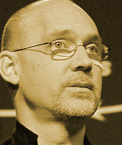- Introducing Visual Studio 2010
- Another Interview on Cloud Platforms
- Introducing Windows Server AppFabric
- Visiting Mexico City for the SG Cloud Conference
- Talking about Cloud Platforms in Brussels on May 12
- A Short Interview on Cloud Computing
- Platforms in the Cloud: Where Will Your Next Appli...
- Presentation Integration and Blue Prism
- Azure Speaking Tour: Asia/New Zealand Dates
- Good Book: Development with the Force.com Platform
Opinari
# Saturday, July 31, 2010
Even though so much is available on the Web, I still find the best stuff in books. This shouldn't be surprising, I suppose, since the subjects I'm most interested in right now are bigger than a few blog entries can handle.
This summer, there have been three books that really made a difference in how I understand the world:
- Adventures of an IT Leader, by Robert D. Austin, Richard L. Nolan, and Shannon O'Donnell. How many people who work in IT really understand the challenges a CIO faces? How many business leaders have any sense at all of what that job entails? Whatever that number might be, it's not big enough. This book, a business novel reminiscent of Eliyahu Goldratt's The Goal, is by far the best thing I've seen for filling this gap. Anybody who works in IT, at any level, needs to read this book. And since one of the authors is a former playwright, it's compulsively readable.
- The Origin of Wealth: Evolution, Complexity, and the Radical Remaking of Economics, by Eric D. Beinhocker. Okay, I know it's a strong statement, but this just might be the best non-fiction book I've ever read. As a one-time economics student (in fact, my first professional job title was "Economist"), I found this book's analysis of what's wrong with conventional economics absolutely compelling. And that's just the first half--it gets better from there. The first chapter is available for free here; read and it see what you think. For me, just this part of the book rocked my view of the world. (Actually, I suspected that I'd like it right from the start: The book's epigraph is a quote from Tom Stoppard's Arcadia, my all-time-favorite play.) Thanks to my Dutch friend Dik Bijl for pointing me to this great, great book.
- The Nature of Technology: What It Is and How It Evolves, W. Brian Arthur. A bit more academic than the other two I've listed here, this book takes a serious look at a topic that's close to all of our hearts: technology. I always like to have a big-picture view of a topic, a frame to surround the details of the picture in my head. Until I read this book, I hadn't realized that I was missing a frame for thinking about technology itself. Brian Arthur provides that frame, and it's remarkably useful. His work is also cited in The Origin of Wealth--he's a smart guy--and this book offers a lot to anybody who works with technology.
0 comments :: Post a Comment
<< Home

